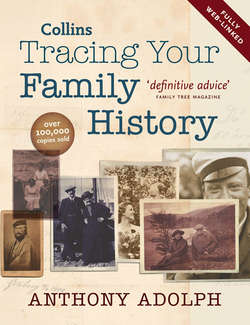Читать книгу Collins Tracing Your Family History - Ryan Tubridy, Anthony Adolph - Страница 87
OTHER USEFUL POINTERS
ОглавлениеUntil 1874, stillborn children did not have to be registered. When children died very young, you will sometimes find their death but not their birth has been registered.
Like other certificates, information recorded on death certificates will often be slightly unreliable, but none more so than on elderly peoples’ death certificates, because the informant was invariably of a younger generation and unlikely to know all the facts for certain. Doctors, care-home workers or friends can register deaths and they may scarcely have known the deceased, but bereaved children are equally unlikely to get all the facts straight.
Do not forget that death certificates can provide information on people born long before General Registration began. The death certificate of an elderly ancestor in 1837 will provide co-ordinates on your family history back in the 18th century.
If a coroner’s inquest took place, this will be noted on the death certificate. Coroners’ records are closed to access for 75 years after the event and many have been destroyed. Those over 75 years old and which have survived are usually to be found in the relevant county record office, and their whereabouts is detailed in J. Gibson and C. Rogers’ Coroners’ Records in England and Wales (FFHS, 1997). A much better way of finding details of an inquest, however, is to look in the local newspaper (see Chapter Fourteen).
Death certificates seldom provide much useful information in themselves, but they can be helpful if you are stuck.
